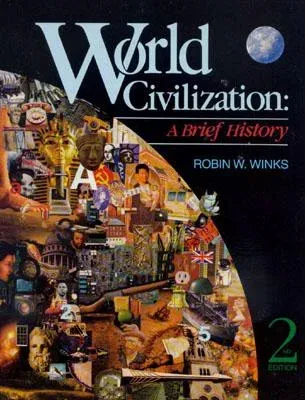Robin W. Winks placed particular emphasis on those developments that
most directly explain the nature of the modern world: social diffusion,
group and national consciousness, technological change, religious
identities-those aspects of intellectual history that have contributed
most to our current dilemmas. In turn this means that there is more in
World Civilization: A Brief History about nationalism, imperialism, or
ethnic identities than there is about monarchies, feudalism, or
diplomacy. The result of the strategic and intellectual decisions made
with respect to this textbook is that its proportions are not the
customary ones. Particular emphasis is placed on the early origins of
civilizations, on Greece and Rome, and on the period of the so-called
barbarian invasions, because it is by studying these periods that
students may best learn how societies are formed. Particular emphasis is
also placed on the period from the French Revolution on, for it is the
events of the last two hundred years that have most closely shaped our
present condition. This book can be read, straight through and in its
entirety, as an interpretive statement about Western history written by
a person who knew a good bit about non-Western history and who could
thus throw into perspective the unusual, the commonplace, and the
comparable in that sector of history conventionally labeled 'Western'.
The text draws on over thirty-five years of discovering, in the
classroom, what students themselves wish to ask about the past rather
than what a body of scholars may have concluded they should wish to ask.
Though this book is largely about Western civilization, it is also about
world civilizations, for from the eighteenth century forward--and in
many aspects of life, much earlier-the non-West has interacted with the
West in such a way as to make it virtually impossible to separate one
from the other when dealing at this level of generalization. As a
teacher of the history of exploration and discovery, of imperialism and
decolonizati

